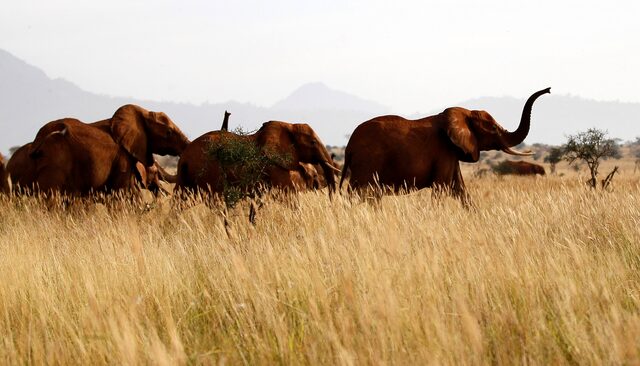Herder killed in Tsavo East during confrontation with KWS officers

The Kenya Wildlife Service expressed its condolences to the family of the deceased herder and regretted the incident, which occurred despite the historically peaceful relationship between KWS and the Kone community.
One herder was killed after 30 armed individuals invaded Tsavo East National Park on Sunday sparking a confrontation with Kenya Wildlife Service (KWS) officers, according to a statement from KWS.
KWS reported that the herders, who had entered the park illegally, were encountered by officers conducting a routine security patrol in Yakalicha, approximately 16 kilometres inside the park.
More To Read
- Counties intensify pressure on national government over park revenue-sharing model
- Lewa, KWS launch vulture tracking project to boost raptor conservation
- Conservationists demand probe into relocation of orphaned giraffes from Wajir to Nanyuki
- Wajir South MP condemns relocation of orphaned giraffes to Nanyuki
- KWS moves reticulated Somali giraffes from Wajir to Nanyuki in major conservation effort
- Wildlife compensation claims hit Sh3.5 billion as thousands of Kenyans wait years for payments
In the ensuing altercation, KWS said the herders attacked the officers with poisoned arrows and advanced aggressively.
Tragically, one herder was fatally injured during the clash, while a KWS officer narrowly escaped death when a poisoned arrow struck their firearm.
The Kenya Wildlife Service expressed its condolences to the family of the deceased herder and regretted the incident, which occurred despite the historically peaceful relationship between KWS and the Kone community.
“We extend our deepest condolences to the family of the deceased herder. This incident is regrettable, especially considering the historically harmonious relationship between KWS and the Kone community,” KWS said in a statement on Monday.
KWS said it has reported the incident to the Directorate of Criminal Investigations (DCI) in Mutomo, Kitui County, and Garsen, Tana River County.
It added that investigation teams have been dispatched to the site to establish the full circumstances of the event, with KWS fully cooperating with the ongoing probe.
The Service also addressed the rising tensions in the region, linking the incident to increased hostility along the northeastern boundary of Tsavo East National Park.
KWS accused some political leaders of inciting the local community to settle and herd livestock within the park, despite false promises of land acquisition.
“Unfortunately, a section of the local community has been incited to illegally invade and settle within the park with false promises of acquiring land. This incitement has led to the illegal construction of makeshift settlements within the park,” KWS said.
It noted that in November 2024 violence in the area resulted in the burning of a police station and the displacement of a KWS security base at Kalalani inside South Kitui National Reserve.
Despite these challenges, KWS said it has continued its efforts to promote peaceful coexistence, engaging the Kone community through barazas (community meetings) with local elders, National Government Administration Officers (NGAO), and leaders. The engagements have reportedly led to improvements in relations and calmer conditions in some areas.
Additionally, KWS said it has undertaken Corporate Social Responsibility (CSR) initiatives, including the drilling of a borehole to provide water for local communities and the construction of classrooms to improve educational facilities for the Kone community.
The Service reiterated that illegal entry into national parks is a criminal offence under the Wildlife Conservation and Management Act, Cap 376, and condemned the continued incitement by leaders claiming it has exacerbated tensions and contributed to the tragic incident.
“We urge all communities to respect protected areas and work collaboratively to ensure the safety of wildlife, park personnel, and residents.”
KWS further said it remains dedicated to conserving Kenya’s wildlife while fostering peaceful coexistence with communities neighbouring the parks.
Top Stories Today













































